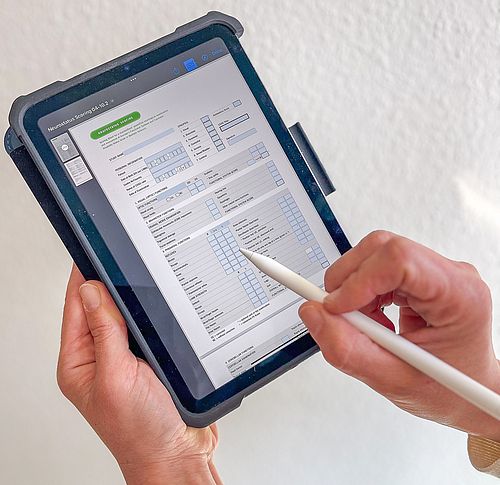1. April 2025
Neurostatus-SMARTCARE paves the way for decentralised clinical studies in multiple sclerosis
With Neurostatus-SMARTCARE, the established EDSS assessment for multiple sclerosis will, for the first time, be available for decentralized clinical studies. Designed to enhance the efficiency and inclusivity of MS clinical trials, it enables specifically trained non-physician professionals to conduct reliable neurological assessments, thereby improving patient care regardless of location.
Monitoring the progression of multiple sclerosis (MS) requires regular examinations by a neurologist. The symptoms of those affected are recorded in a standardised manner. The most important tool for this is the Neurostatus Expanded Disability Status Scale (EDSS), an assessment system used in phase II and III clinical studies around the world to measure the severity of disability in people with MS. The Neurostatus-EDSS and its digital version, the Neurostatus-eEDSS, were developed in Basel and are considered the "gold standard" for clinical registration studies in MS.
Since the coronavirus pandemic, there has been a clear trend towards decentralised clinical studies. Thanks to telemedical visits and tests at home, participation in such a study is less time-consuming, which is particularly beneficial for MS patients with severe mobility restrictions. However, the challenge for study staff is to ensure that the recording and assessment of clinical symptoms is carried out remotely with the same consistency as in-person health checks.
PD Dr. med. Marcus D'Souza and Vanny Phavanh (Neurology, USB) provide insight into the project.
Decentralised EDSS examinations through Neurostatus-SMARTCARE
Neurostatus-SMARTCARE takes this aspect into account. The research group led by DKF research group leader PD Dr. Marcus D'Souza has designed a "decentralised" version of the established digital Neurostatus-EDSS with the aim of enabling non-physician healthcare professionals to perform EDSS assessments just as reliably as neurologists.
In a recently published study, the Neurostatus-EDSS assessments of SMARTCARE-trained nurses and neurologists at two Swiss neurology clinics were assessed. The study results show a high level of agreement and thus confirm that nonmedical and medical professionals can perform neurological assessments of comparable quality with the help of Neurostatus-SMARTCARE.
Neurostatus-SMARTCARE thus paves the way for decentralised MS studies and also promises better care for study participants: By also qualifying non-physician healthcare professionals to perform the Neurostatus-EDSS, MS patients can be more reliably monitored and increasingly included in clinical studies, regardless of where they live or the availability of neurologists.

"By qualifying non-physician healthcare professionals to perform the Neurostatus-(e)EDSS, MS patients can be monitored more comprehensively and increasingly included in clinical studies."
PD Dr. med. Marcus D'Souza

Neurostatus-SMARTCARE clinical trial
Enabling healthcare professionals to assess EDSS for decentralised trials in multiple sclerosis.
Head
PD Dr. med. Marcus D'Souza, Attending Physician Neurology, Head Neurostatus UHB
Study design
Multicentre, randomised, cross-over study
Study centres
University Hospital Basel
Lucerne Cantonal Hospital
Number of study participants
100 MS patients
DKF services
Regulatory
